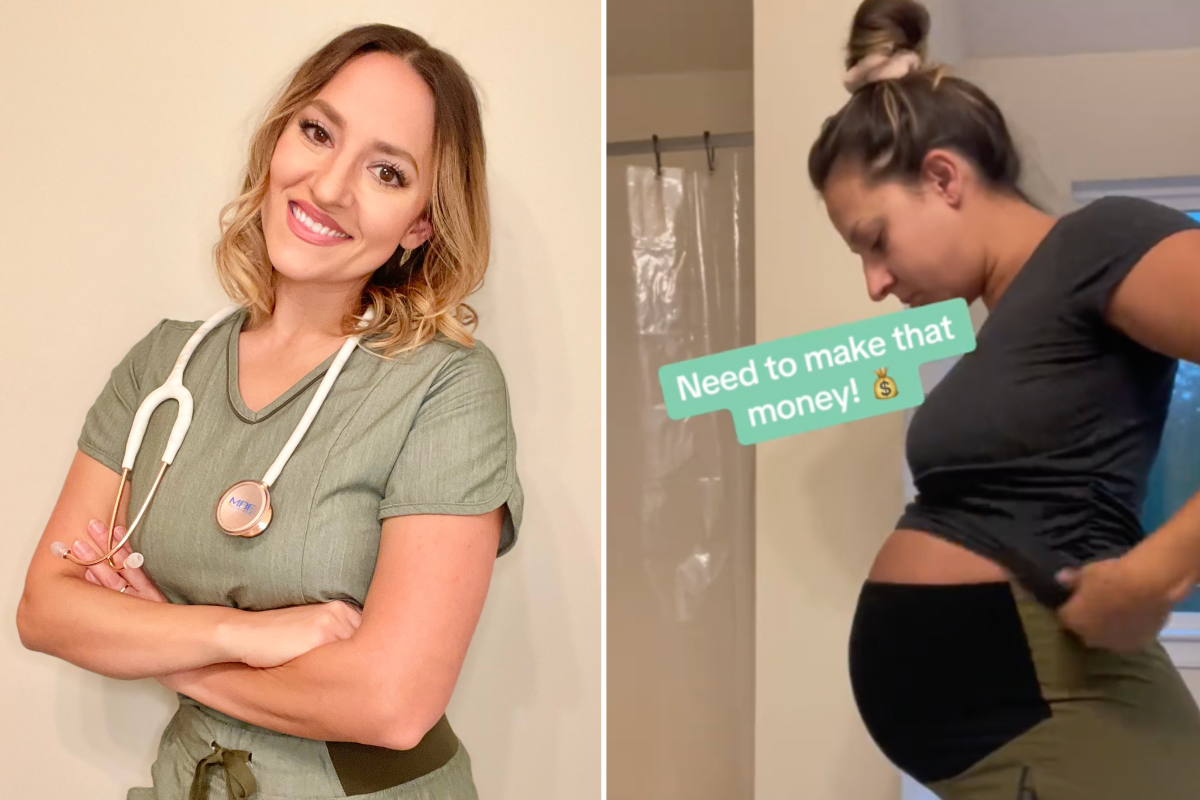A woman getting ready for her 12-hour hospital shift at nine months pregnant has stunned the internet.
In a video with over 6.1 million views, Sarah—who keeps her surname private—shared footage of herself on TikTok as @labor_junkie_rn, getting ready for a day as a labor nurse. She joked, "No but seriously, I can REALLY relate to my patients," before a long day at work. Her baby is due on August 3, and she has been a labor nurse for over 14 years.
"I accepted my dream job as a labor, delivery and postpartum nurse on a high-risk unit in 2014 and have been working here ever since," Sarah told Newsweek. "I created my educational TikTok account a year ago and have been proud to offer judgment-free and evidence-based information about perinatal care to the masses." Alongside sharing the inside track on her career and day-to-day work, Sarah is also recording her own pregnancy. Expecting her third baby, she has continued to work.

In the U.S., the Family and Medical Leave Act (FMLA) allows eligible employees to take up to 12 weeks of unpaid leave for family or medical reasons with their job protected.
President Bill Clinton signed the FMLA into law on February 5, 1993. However, to qualify for it, an employee must have worked for their employer for at least 12 months, worked at least 1,250 hours in the past year, and work at a location with at least 50 employees in a 75-mile radius.
States have their own laws that expand upon FMLA and provide additional benefits, but the majority of time taken off to give birth and care for a new baby will be given by FMLA, vacation days or sick leave.
Similarly, many private-sector companies have their own parental-leave policy to support parents. For example, Netflix and the Bill and Melinda Gates Foundation both offer extended paid leave for new parents.
After watching the video of Sarah preparing for her shift, many viewers were stunned and praised her for her dedication to work.
"While this is not shocking or unusual for me being that it's my third time working throughout pregnancy, I certainly can understand that reaction," Sarah said. "Most people shocked by this concept of working while nine months pregnant are individuals who simply haven't been exposed to maternal care in the United States.

"Generally, the outrage and shock comes from people living outside of the U.S. or those who do live here, but have yet to experience pregnancy or birth firsthand as an American," Sarah said. "Or perhaps Americans that have experienced pregnancy and birth, but work for companies that can offer outstanding benefits throughout employee's pregnancy and postpartum period."
In sharing the video, Sarah wanted to point out that situations like her own are far from rare, and that many expectant mothers will also be working up until the day their baby is born.
"My situation is very common and not at all unique to me. The fact is, the U.S. as a whole offers little support to pregnant and postpartum employees and even less support to families and parents," Sarah said.
While many parents won't receive any support—and some may even be denied proper time off after birth—Sarah added that her individual situation does give her some leave.
Entitled to six weeks of Short Term Disability (STD) after giving birth, she will not qualify for any paid leave and also can't receive FMLA time-off because she works part-time.
"This is just how the system has been set up," Sarah said. "This creates a massive inequity among pregnant employees throughout the nation. Some companies are able to offer incredible benefits to their pregnant and postpartum employees, and others simply can't."
Sarah is responsible for half of her family's household income, and unpaid leave presents a dilemma for their finances.
"Our family has found ways to creatively navigate this situation and meet our needs. But many other families are not as fortunate—they are forced to return to work after a few short weeks or even days of giving birth simply to make ends meet," Sarah said.
Many TikTok users responded to the video in shock and shared their thoughts in the comments.
"Can't believe no paid leave," wrote Nilbelian. "In Norway both mom and dad get paid leave from work up to 1 year after baby born. It's standard."
"No paid leave!" Louise Amy posted. "How can these governments live with themselves."
But others sympathized with Sarah's situation and shared their own stories. Ashptashlow commented: "I'm an occupational therapist also working through my entire pregnancy with no paid maternity leave!"
Lynnk243 wrote: "As a healthcare worker I don't get paid maternity leave either but working at Walmart, I got 16 weeks paid."
"Honestly for me, this video was just another post on another day," said Sarah. "I can see why it resonates or strikes a cord with many, but the reality is that for me working 12- hour shifts—pregnant or not—is standard."
"This video sparks a much bigger conversation: the massive shortcomings in maternal health here in the U.S.," Sarah added. "As much as I genuinely love my country, it certainly is not perfect—and it's OK to acknowledge that.
"Because identifying imperfections and flaws is where change really begins. So as uncomfortable as I feel about controversy, I'm proud that my typical day at work draws awareness to this critical topic," Sarah said. "And I hope it challenges us all to reevaluate the way we, as a country, prioritize—or fail to prioritize—maternal health and wellness."
Uncommon Knowledge
Newsweek is committed to challenging conventional wisdom and finding connections in the search for common ground.
Newsweek is committed to challenging conventional wisdom and finding connections in the search for common ground.
About the writer
Alice Gibbs is a Newsweek Senior Internet Trends & Culture Reporter based in the U.K. For the last two years ... Read more
To read how Newsweek uses AI as a newsroom tool, Click here.








